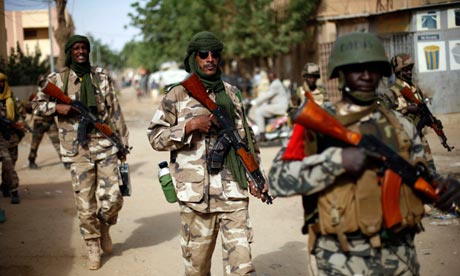African and western nations have pledged more than $450m (£286m) to fund an African-led military force to fight Islamists in Mali, as Britain and Germany increased logistical support to the French intervention on the ground.
The African-led support mission in Mali, known as Afisma, has already seen troops arriving steadily from several countries including Nigeria and is eventually expected to take over operations from France. But the needs of the sudden and laborious mission have mushroomed and the overall budget is likely to be nearer $960m.
Among the biggest donors was Japan, which suffered the heaviest foreign losses in the In Amenas gasfield siege in Algeria last week with 10 workers killed. Tokyo said its pledge of $120m in aid and support for refugees reflected its "unshaken resolve to fight terrorism".
France, which has 3,500 troops on the ground in Mali, is paying for its own initial intervention, codenamed Operation Serval. It has not asked other western nations to contribute ground forces, but there was relief in Paris as Britain, the US and Germany increased their support in terms of logistics, transport and intelligence.
There had been tension between France and the US at the end of last week when Washington handed Paris a $20m bill for the use of its transport flights. Irked, Paris calculated that it amounted to $50,000 dollars per hour of flight time, according to Le Monde.
The bill was dropped and the differences appeared to have been patched up at the weekend when the US announced it would fly tankers to refuel French fighters and bombers, stepping up the American involvement considerably and effectively directly supporting military attacks.
Germany's offer of a third transport aircraft to carry west African troops to Mali was looked upon favourably by France after the Mali operation initially seemed to put strain on the Paris-Berlin relationship and their different views of intervention abroad. Germany is traditionally reticent to intervene, as it showed by standing back from the recent Libya campaign.
Germany pledged $20m to the UN fund for the African mission in Mali, but its foreign minister, Guido Westerwelle, pointedly noted: "In the long-term there can only be a political solution" to Mali's problems.
European government officials met in Brussels on Tuesday to decide how to put together a 500-strong military training mission to be sent to Mali in a fortnight, amid growing complaints about how the war in Sahel is highlighting an EU security policy and defence capacity vacuum.
Amid speculation that an EU "battle group" of 1,700 troops on constant standby for emergency deployment could be rushed to Sahel, senior officials in Brussels admitted this was a non-starter. The group's main real function was for practice, senior sources said.
The necessary consensus of 27 EU governments on a deployment was impossible to reach in any case and had not been attempted. While use of the battle group had been discussed in Brussels, the issue had not been raised with EU governments as there was no point.
General Patrick De Rousiers, the French air force officer who heads the EU's military committee, said the French-German-Polish group currently on standby was "useful for keeping up the level of the unit. The aim is to foster interoperability between nations."
He added: "When will at last the battle groups be deployed? When the 27 agree." Since being formed six years ago, the rotating six-month battle groups have never seen action.
De Rousiers stressed that France was receiving logistical help from 10 EU countries. "The training mission in Mali is really the sign that the EU is engaged," he said. "France is not alone at all. France, I imagine, should be happy having what it has."
A French diplomat said of the Mali ground operation: "The decision was taken by France to go in alone. We knew from the start that it would be an operation supported by African forces. It was never a question of a European ground troop mission. But Europe's role in training the African force has now been accelerated. Things are falling into place, we don't have any criticisms to make."
Colonel Michel Goya, a senior French officer, told the EUobserver website: "The EU doesn't know how to wage war. It's not prepared to launch military operations of this type."
He said it was difficult enough waging war by Nato committee, as in Libya or in 1999 in Serbia and Kosovo. "It would be even worse at EU level. If we do it alone, it's more efficient in military terms. We have more freedom of action if we do it alone."

No comments:
Post a Comment